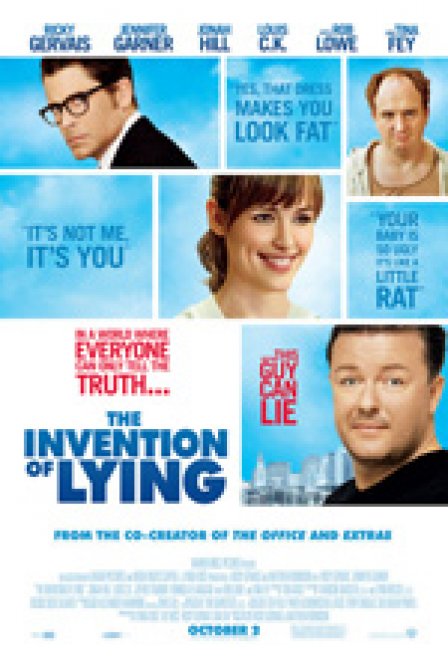The Invention of Lying takes place in an alternate universe, where it would be impossible for me to publish a review with the sentence, "This film is every bit as good as I expected it to be." Why? Because it's not true. The excruciating awkwardness that Ricky Gervais sharpened into an almost-too-painful-to-watch point on his genius Brit-coms The Office and Extras is perfectly tailored to the clever concept of this film. Indeed, a world where no one can fib, mislead, or soften the awful truth should have been a comedic wonderland for a socially inept blunderer like David Brent. But while The Invention of Lying could have been a high-concept comedy clever enough to rival a modern classic like Groundhog's Day, it instead derails into a poorly-executed romantic comedy, rife with wasted talent (the film's all-star cast of comedian's comedians -- Louis C.K., John Hodgman, Tina Fey, Jeffrey Tambor -- are never given room to be funny) and loose ends.
A world without fiction is a refreshingly novel concept for an era where celebrity spy cam footage is labeled "reality television" and Michael Moore's muckraking feature films are considered documentaries. The Invention of Lying starts off strong, with self-deprecating loser protagonist Marc Bellison (Gervais) taking the obviously out-of-his-league Anna McDoogles (Jennifer Garner) on a date. The advantages and disadvantages of a date without discretion are apparent the second Anna opens the door and says, "You're early. Sorry, I was just masturbating," to which Marc replies, "That makes me think of your vagina." Both quickly acknowledge the limited prospects of the date, but Marc remains hopeful despite Anna's blunt dismissal of his looks and inferior genetics. This hysterical first scene establishes the two main themes of the film: First, there is the plight of poor Marc, who suffers as a sad schmuck in a society where everyone is impolite enough to point out that he is exactly that. Then there is the less interesting romance he hopes for with Anna.
Lying quickly sketches out the parameters of its universe, setting up its themes and indulging in a couple of decent gags, one of which entails imagining what advertising would look like without embellishment. Gervais subscribes to Thoreau's theory about the masses leading lives of quiet desperation, but without the luxuries of fiction and fabrication, that despair is anything but quiet.
It doesn't take long for Marc to stumble onto his paradigm-shattering ability: In a world of truth-tellers, he alone has the capacity to "say something that isn't." Skepticism doesn't exist in this universe, so as soon as Marc invents his first fib, a city of gullible saps is at his mercy. Marc realizes he can exploit his dubious talent for money and sex, but while pursuing the latter with the help of a particularly dramatic pickup line ("If you don't have sex with me right now the world is going to end!"), he discovers that lying is often accompanied by guilt. The film could have been successful purely by fleshing out Marc's character and examining his adventures as a shyster in the land of suckers, but unfortunately it gets distracted by a second-act God complex.
To comfort his mother on her deathbed, Marc reassures her that death isn't just never-ending nothingness, and thus accidentally invents the afterlife. Word spreads and soon Marc is delivering his ten commandments (using Pizza Hut product placement in lieu of stone tablets) to a world eager to learn more about what happens after death and this "man in the sky" character who decides whether we live in a mansion for eternity or go to a bad place. But Gervais is far better with comedy than theology, so the laughs get lost, as he tries to carry the unwieldy narrative. Religion holds tremendous potential for humor, and viewers may recognize in Gervais' alternate reality the clueless literalism of many of its followers. Yet Lying veers into clichéd inevitabilities, instead of successfully making a grand statement on the existence and power of religious fictions.
Gervais is certainly adept at producing comedy out of life's dark, awkward, uncomfortable moments. Both of his British series exhibited a comic sadness that is lacking in the similarly painful Curb Your Enthusiasm (which competently tackled meaning-of-life issues a few seasons back). Unfortunately, in the course of his journey from the BBC to the big screen, Gervais abandoned that edge, seeming to give into the bland obviousness of popular American screenwriting. Since he splits the writing/directing credit with first-time filmmaker Matthew Robinson, it's hard to tell who is to blame for the film's many flaws. Though visually unambitious and structurally weak, Invention of Lying packs enough laughs to partially redeem its lulls. A forgiving audience will find a lot to like, but anyone trying to sell this film as intelligent satire is nothing more than, well, a liar.

